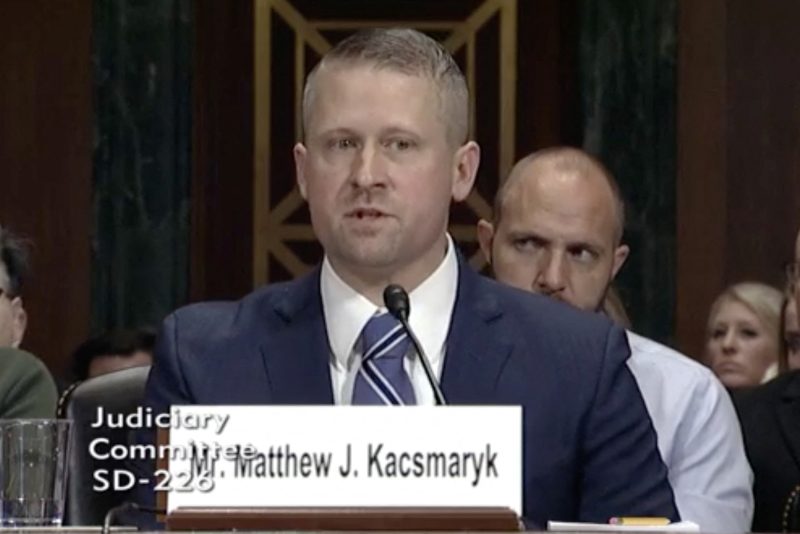As a lawyer for a conservative legal group, Matthew Kacsmaryk in early 2017 submitted an article to a Texas law review criticizing Obama-era protections for transgender people and those seeking abortions.
The Obama administration, the draft article argued, had discounted religious physicians who “cannot use their scalpels to make female what God created male” and “cannot use their pens to prescribe or dispense abortifacient drugs designed to kill unborn children.”
But a few months after the piece arrived, an editor at the law journal who had been working with Kacsmaryk received an unusual email: Citing “reasons I may discuss at a later date,” Kacsmaryk, who had originally been listed as the article’s sole author, said he would be removing his name and replacing it with those of two colleagues at his legal group, First Liberty Institute, according to emails and early drafts obtained by The Washington Post.
What Kacsmaryk did not say in the email was that he had already been interviewed for a judgeship by his state’s two senators and was awaiting an interview at the White House.
As part of that process, he was required to list all of his published work on a questionnaire submitted to the Senate Judiciary Committee, including “books, articles, reports, letters to the editor, editorial pieces, or other published material you have written or edited.”
The article, titled “The Jurisprudence of the Body,” was published in September 2017 by the Texas Review of Law and Politics, a right-leaning journal that Kacsmaryk had led as a law student at the University of Texas. But Kacsmaryk’s role in the article was not disclosed, nor did he list the article on the paperwork he submitted to the Senate in advance of confirmation hearings in which Kacsmaryk’s past statements on LGBT issues became a point of contention.
Now, six years later, as Kacsmaryk sits as a judge in Amarillo, Tex., his strong ideological views have grabbed the country’s attention after his ruling last week that sought to block government approval of a key drug used in more than half of all abortions in the country — an opinion that invoked antiabortion-movement rhetoric and which some medical experts have said relied on debunked claims that exaggerate potential harms of the drug.
Kacsmaryk did not respond to a request for comment. A spokesman for First Liberty, Hiram Sasser, said that Kacsmaryk’s name had been a “placeholder” on the article and that Kacsmaryk had not provided a “substantive contribution.” Aaron Reitz, who was the journal’s editor in chief at the time and is now a deputy to Texas Attorney General Ken Paxton (R), said Kacsmaryk had been “our chief point of contact during much of the editing” and “was the placeholder until final authors were named by First Liberty.”
On Saturday, after this story was first published, Sasser provided an email showing that Stephanie Taub, one of the people listed as an author on the published article, was involved in writing an early draft.
But one former review editor familiar with the events said there was no indication that Kacsmaryk had been a “placeholder,” adding that this was the only time during their tenure at the law review that they ever saw author names swapped. The former editor, who spoke on the condition of anonymity out of fear of reprisal, provided emails and several drafts of the article.
The circumstances surrounding the article’s authorship raise questions about whether a judicial nominee was seeking to duck scrutiny from a process designed to ensure that judges are prepared to interpret the law without personal bias, said lawyers who worked on judicial nominations in Republican and Democratic administrations — speaking hypothetically and not specifically about Kacsmaryk.
Adam H. Charnes, who worked on judicial nominations while the principal deputy in the Justice Department’s Office of Legal Policy under President George W. Bush, said he would not have advised potential nominees to withdraw articles they had written or to publish them under others’ names.
“I’m pretty sure the Senate would expect you to produce something like that,” Charnes said.
The scenario “strikes me as problematic,” he said — and, he added, “a little shady.”
The Senate Judiciary Committee’s questionnaire requires nominees to disclose any publication with which they are associated, regardless of whether they are formally listed as authors, said Alex Aronson, who was a former chief counsel to Sen. Sheldon Whitehouse (D-R. I) and led judicial nominations for the senator. Whitehouse questioned Kacsmaryk during his confirmation hearing.
“That would certainly seem to encompass a published article that a nominee effectively ghostwrote,” Aronson said.
To leave such a publication off the questionnaire, he added, is “unethical” and raises concerns about “the candor and honesty of the nominee.”
The Post also interviewed another Republican lawyer who worked on judicial nominations in the Bush White House, at the recommendation of a friend of Kacsmaryk’s, who was told about this story ahead of publication. That lawyer, Mike Davis, said the situation did not raise any ethical concerns.
“A judicial nominee is not required to disclose draft legal writings under the Senate Judiciary Committee’s rules or practice,” said Davis, who runs a nonprofit entity that advocates for conservative judges.
“It looks like [Kacsmaryk] didn’t want to have any political controversy,” Davis added. “It’s still within the rules.”
When Kacsmaryk submitted the article in early 2017, he was deputy general counsel for First Liberty. By early April, he was well on his way to a judicial nomination. He was interviewed by members of the Federal Judicial Evaluation Committee in Dallas on March 3, then flew to D.C. to meet with Republican Sens. Ted Cruz and John Cornyn, both of Texas, on April 3, according to a timeline Kacsmaryk submitted to the Senate Judiciary Committee.
One week later, on April 11, he emailed an editor with a draft of the article, noting that he had made one small change, attaching a file titled “MJK First Draft.” (“MJK” are Kacsmaryk’s initials.)
“I modified the last sentence in the opening paragraph of section III,” Kacsmaryk wrote. At the end of the message he added, “Keep fighting the good fight!”
In late April — about a month before Kacsmaryk traveled to D.C. to meet with lawyers from Trump’s White House Counsel’s Office — he informed his editor that after consulting with the editor in chief, he would be replacing his name with two others’.
“For reasons I may discuss at a later date, First Liberty attorneys Justin Butterfield and Stephanie Taub will co-author the aforementioned article,” he said, according to an email obtained by The Post.
Butterfield and Taub, who still work at First Liberty, did not respond to requests for comment.
Before this story was published, Sasser said he had emails proving Kacsmaryk was not the actual author, but declined to share them with The Post.
“Matthew appears to have not gotten to the project so Stephanie decided to do a first draft that Justin edited,” Sasser wrote in a statement. “It appears Matthew provided some light edits.”
After publication, Sasser sent what he said were emails showing that Taub, who was then associate counsel, was involved in writing the article as early as December 2016. She sent an outline to Kacsmaryk, according to the emails provided by First Liberty, and then a first draft one month later.
“Here is a first draft of the article,” Taub wrote on January 17, 2017, according to emails provided by First Liberty. “Please let me know if you’d like more work on this or if you’ve got it from here.”
Neither Taub nor Butterfield’s name appears in the draft originally submitted by Kacsmaryk, including in the footnotes, according to emails and documents provided by the editor.
When Kacsmaryk requested the authorship switch, the editor familiar with the events said they raised the issue with Reitz, the law review’s editor in chief. The lower-ranking editor asked why Kacsmaryk was making the request.
Reitz smiled, the editor recalled, then said, “You’ll see.”
Reitz did not address the exchange with the editor in his statement to The Post. But he said that “because of their work on the article, Mr. Butterfield and Ms. Taub rightfully received credit as authors.”
Even after Butterfield and Taub were designated the authors, Kacsmaryk remained involved, the emails show, offering additional minor edits. The final version is almost identical to the one submitted under Kacsmaryk’s name.
Trump nominated Kacsmaryk to the federal bench in September 2017, the same month the article was published.
During his confirmation hearing that December, Democratic senators questioned Kacsmaryk extensively on his views on LBGT rights and abortion — issues at the heart of the article he had submitted to the law journal.
The journal article argues against a 2016 Department of Health and Human Services rule forbidding doctors to discriminate against patients who seek gender-affirming care or pregnancy termination. The rule from the Obama administration, the article says, should contain a “conscientious objector” exception.
A law review article is exactly the kind of material the Senate Judiciary Committee is trying to gather in the judicial confirmation process, several people said, because it provides a sense of the judge’s personal opinions.
While it is unfair to judge a nominee on work done on behalf of a client, said Charnes, the Republican who worked under Bush, “a law review article is different.”
“Those are [the author’s] views,” Charnes said — exactly what the Senate is trying to evaluate.
Kacsmaryk has defended his ability to be impartial in his work.
“As a judge, I’m no longer in the advocate role,” he said during his confirmation hearing. “I’m in the role of reading and applying with all good faith whatever Supreme Court and 5th Circuit precedent is binding.”
Asked whether transgender Americans should have equal protections, Kacsmaryk told the Senate Judiciary Committee that they should have “what the law provides.”
Many of Kacsmaryk’s recent decisions have been wins for the right, including two that struck down new Biden administration protections for transgender people. One decision, issued late last year, involved the same issues raised in the journal article, “Jurisprudence of the Body.”
Kacsmaryk sided with doctors represented by America First Legal Foundation, set up by former Trump White House adviser Stephen Miller, who challenged HHS guidelines designed to protect transgender patients against discrimination.
In his ruling, Kacsmaryk said that under Biden, HHS had wrongly interpreted a provision of Obama’s Affordable Care Act and had misapplied the landmark Supreme Court case extending workplace protections to gay and transgender individuals. The judge credited the doctors’ position that they should in certain situations still be able to refuse hormonal therapy and other forms of gender-affirming care for transgender patients.
This story has been updated to include references to emails provided by First Liberty after publication.
Alice Crites contributed to this report.



























